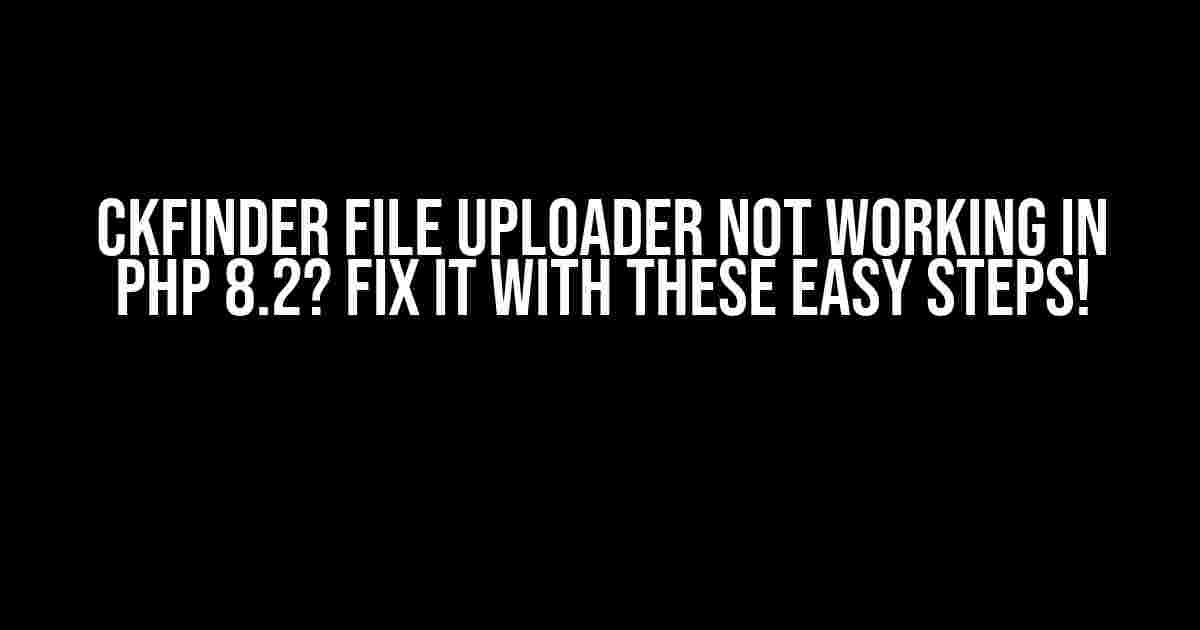Are you frustrated with CKFinder file uploader not working in PHP 8.2? You’re not alone! Many developers have faced this issue, and it’s not because of a faulty plugin, but rather due to some compatibility issues with the latest PHP version. In this article, we’ll guide you through the troubleshooting process, providing clear and direct instructions to get CKFinder up and running smoothly in PHP 8.2.
The Problem: Incompatibility with PHP 8.2
CKFinder, a popular file uploader plugin, has been widely used with PHP-based applications. However, with the release of PHP 8.2, many developers started experiencing issues with CKFinder. The problem lies in the changes made to PHP 8.2, which affect the way CKFinder interacts with the server.
What are the Symptoms?
If you’re experiencing any of the following symptoms, it’s likely that CKFinder is not working due to compatibility issues with PHP 8.2:
- The file uploader is not displaying properly or is not responding.
- Files are not being uploaded, or the upload progress is stuck.
- Error messages are displayed when attempting to upload files.
- The CKFinder interface is not loading correctly or is showing a blank page.
Troubleshooting Steps
Before we dive into the fixes, make sure you’ve checked the following:
- CKFinder is correctly installed and configured.
- The necessary dependencies, such as jQuery, are included and up-to-date.
- Your PHP installation is up-to-date, and all required extensions are enabled.
Step 1: Update CKFinder to the Latest Version
The first step is to ensure you’re running the latest version of CKFinder. Sometimes, updates can resolve compatibility issues. Check the CKFinder website for the latest version, and follow their installation instructions to update your plugin.
Step 2: Check PHP Configuration
Verify that your PHP configuration is set up correctly. Make sure the following extensions are enabled:
| Extension | Status |
| gd | Enabled |
| exif | Enabled |
| mysqli | Enabled |
In addition, ensure that the `upload_max_filesize` and `post_max_size` directives in your `php.ini` file are set to a reasonable value (e.g., 50M or higher).
; php.ini upload_max_filesize = 50M post_max_size = 50M
Step 3: Adjust CKFinder Configuration
Update the CKFinder configuration to work with PHP 8.2. Edit the `config.php` file and add the following lines:
// config.php
<?php
// ...
'backend' => 'Uploader.php',
'Uploader' => array(
'allowedExtensions' => 'upload,move,copy,delete',
'deniedExtensions' => '',
'backend' => 'Uploader.php'
)
// ...
?>
This configuration tells CKFinder to use the `Uploader.php` backend, which is compatible with PHP 8.2.
Step 4: Define the uploadDir in CKFinder
Specify the upload directory in the CKFinder configuration. This is crucial for CKFinder to function correctly. Add the following line to your `config.php` file:
// config.php <?php // ... 'uploadDir' => 'path/to/upload/directory', // ... ?>
Replace `path/to/upload/directory` with the desired upload directory path.
Step 5: Test CKFinder
After completing the above steps, test CKFinder by attempting to upload a file. If you still encounter issues, proceed to the next step.
Step 6: Check for JavaScript Errors
JavaScript errors can prevent CKFinder from functioning correctly. Use your browser’s developer tools to inspect the CKFinder interface for any JavaScript errors. Fix any errors you find, and test CKFinder again.
Step 7: Contact CKFinder Support (Optional)
If none of the above steps resolve the issue, consider reaching out to CKFinder’s support team for further assistance. They may be able to provide additional guidance or patches to help you resolve the problem.
Conclusion
By following these troubleshooting steps, you should be able to get CKFinder working smoothly with PHP 8.2. Remember to update your CKFinder version, check your PHP configuration, adjust the CKFinder configuration, define the uploadDir, test CKFinder, check for JavaScript errors, and contact CKFinder support if necessary.
Don’t let compatibility issues hold you back from using CKFinder with PHP 8.2. With these easy-to-follow instructions, you’ll be uploading files in no time!
Happy coding!
Frequently Asked Question
Having trouble with CKFinder file uploader not working in PHP 8.2? Don’t worry, we’ve got you covered! Check out our FAQs below to troubleshoot the issue.
Why is CKFinder not working with PHP 8.2?
CKFinder is not compatible with PHP 8.2 due to changes in the PHP framework. Specifically, the `create_function` function has been removed in PHP 8.2, which CKFinder relies on. This incompatibility causes the uploader to malfunction.
How can I fix the compatibility issue with CKFinder and PHP 8.2?
To fix the issue, you can either downgrade to a compatible PHP version (e.g., PHP 7.4) or use a polyfill to replicate the `create_function` functionality. Alternatively, consider migrating to a more modern file uploader that is PHP 8.2 compatible.
What is a polyfill, and how can it help with CKFinder compatibility?
A polyfill is a JavaScript code that replicates the functionality of a deprecated or removed feature. In this case, a polyfill can provide a replacement for the `create_function` function, allowing CKFinder to work with PHP 8.2. You can include the polyfill in your project by adding a JavaScript file that defines the missing function.
Are there any alternative file uploaders that are compatible with PHP 8.2?
Yes, there are several alternative file uploaders that are compatible with PHP 8.2. Some popular options include File Browser, Fancy Upload, and Uploadify. These uploaders offer modern features and are regularly maintained to ensure compatibility with the latest PHP versions.
How can I ensure that my file uploader is secure and protected from vulnerabilities?
To ensure the security of your file uploader, always keep it up-to-date with the latest version, use secure protocols (e.g., HTTPS), and implement proper access controls and validation. Additionally, regularly audit your code and uploaders for vulnerabilities, and consider using a Web Application Firewall (WAF) for extra protection.

